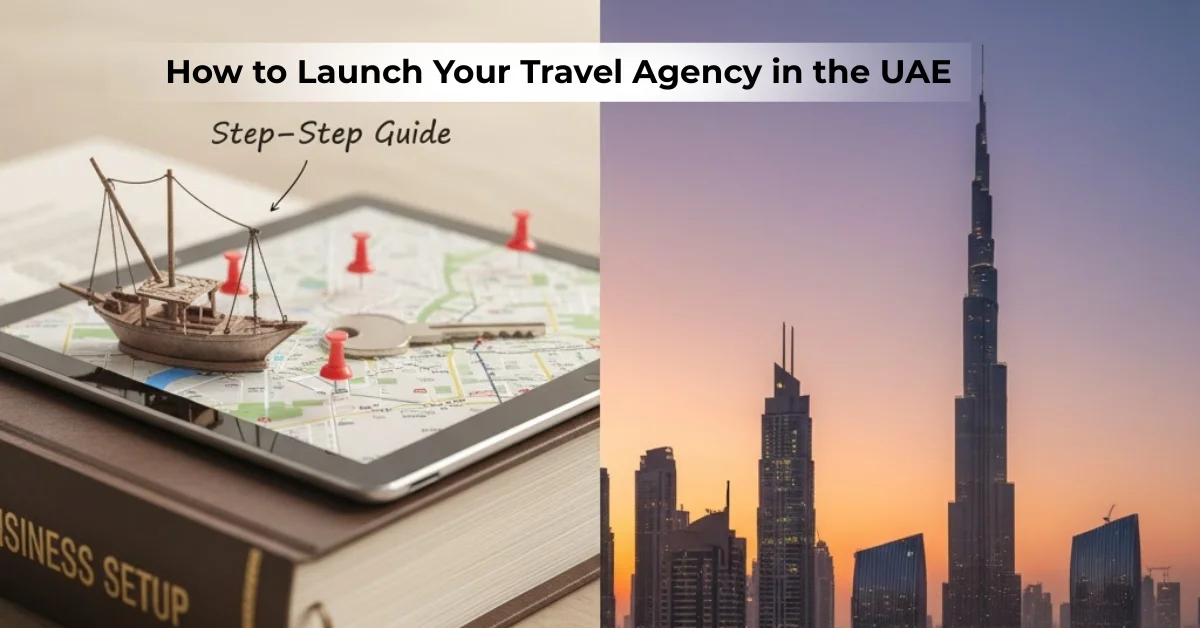The United Arab Emirates has become one of the most dynamic tourism hubs in the world, attracting millions of visitors every year for leisure, business, and adventure. With its world-class infrastructure, modern facilities, and diverse attractions, the UAE continues to strengthen its position as a global travel destination. This creates a huge opportunity for entrepreneurs who want to build a profitable business by opening a travel agency in the UAE.
Starting a travel business in the UAE is not only financially rewarding but also supported by strong government policies that encourage tourism investment. Whether you plan to focus on inbound tourism, corporate packages, or specialized travel services, understanding the legal structure, licensing process, and cost is the first step toward building a successful agency.
Why the UAE Is a Top Choice for Travel Agencies
The UAE’s tourism sector has grown rapidly, becoming a global hub for travelers, business events, and luxury experiences. Dubai alone recorded record-breaking visitors in 2024, and Abu Dhabi continues to invest heavily in sustainable tourism projects.
Here’s why it’s a prime market for travel entrepreneurs:
- Global connectivity: The UAE links Asia, Europe, and Africa, making it a perfect travel hub.
- Government incentives: Tax-free policies, simplified business setup, and free zone benefits attract investors.
- High consumer spending: Both tourists and residents spend heavily on leisure and travel.
- Emerging niches: Adventure tourism, eco-travel, wellness retreats, and medical tourism are expanding fast.
The growing demand ensures that starting a travel agency in the UAE can be both profitable and sustainable when structured properly.
Key Types of Services & Niches in UAE Travel Business
Before setting up your company, it’s essential to decide what kind of travel services you’ll offer. Your niche determines your license type, marketing approach, and profitability.
Common travel business types in the UAE include:
- Inbound Tourism: Organizing packages for tourists visiting the UAE.
- Outbound Tourism: Managing trips for UAE residents traveling abroad.
- Corporate Travel & MICE: Handling travel for business meetings, conferences, and exhibitions.
- Specialty Travel: Offering niche services like luxury tours, eco-friendly holidays, and medical or religious travel.
- Online-Only Travel Services: Providing booking platforms and digital travel solutions without a physical office.
By identifying your niche early, you can choose the right travel agency license in the UAE and meet the relevant authority requirements.
Legal Structure: Free Zone vs Mainland
Your choice between a mainland or free zone setup will influence ownership, costs, and flexibility.
| Feature | Mainland Company | Limited to the package chosen |
| Ownership | 100% foreign ownership (allowed) | 100% foreign ownership |
| Market Access | Can trade directly in the UAE market | Restricted to free zone or international clients |
| Office Requirement | Mandatory physical office | Shared or virtual office allowed |
| License Authority | Department of Economic Development (DED) | Specific Free Zone Authority (e.g., DMCC, RAKEZ) |
| Visa Quota | Based on office size | Limited to package chosen |
Free zones are best for businesses targeting online sales or international clients, while mainland setups work well if you want to serve local clients directly.
Step-by-Step Setup Process
Launching a travel agency in the UAE involves a series of well-defined steps that require both strategic planning and official approvals. The process may seem complex at first, but with a clear roadmap, it becomes a manageable and rewarding journey. Each stage plays a vital role in building a strong foundation for your business and ensuring full compliance with UAE regulations.
Step 1 – Market Research & Business Plan
Every successful travel agency in the UAE starts with detailed market research and a strong business plan. This stage helps you understand your target audience, identify competitors, and estimate your financial goals. Study popular travel destinations, customer preferences, and seasonal trends, such as peak and off-season travel patterns. It’s also essential to create a realistic budget covering marketing, staffing, office setup, and operational costs. Your financial projections should outline the expected income for at least the first year. By analyzing UAE tourism trends and aligning your services with market demand, you’ll position your agency for early success and long-term sustainability.
Step 2 – Company Name & Trade License Application
Once your business plan is ready, the next step is to choose a company name and apply for your trade license. Your business name should reflect your brand’s identity and comply with UAE naming laws, which prohibit offensive or religious terms. You’ll first need to reserve your trade name with the Department of Economic Development (DED) or the relevant free zone authority. After that, prepare essential documents such as passport copies of shareholders, your business plan, and a No Objection Certificate (NOC) if required. Then, you can submit your application for a travel agency license in the UAE, which is the legal foundation of your operation. Obtaining this license confirms that your business is authorized to operate within the UAE tourism sector.
Step 3 – Regulatory Approvals & Permits
Before officially launching your travel agency in the UAE, you must secure the necessary regulatory approvals and permits. In Dubai, this process involves obtaining approval from the Department of Tourism and Commerce Marketing (DTCM), while other emirates have their own tourism authorities. If your agency plans to issue airline tickets or collaborate directly with carriers, you will also need approval from the Civil Aviation Authority. A police clearance certificate is often required to ensure your business record is clean and trustworthy.
Additionally, many agencies must submit a refundable bank guarantee to secure client funds and provide financial protection. These steps confirm that your agency complies with the UAE’s strict travel and tourism standards, giving your clients greater confidence in your services.
Step 4 – Office Setup & Staffing
Your office plays a crucial role in shaping your brand image and customer trust. For a travel agency in the UAE, the office must be accessible, professional, and compliant with local regulations. Mainland companies are generally required to have a physical office, while certain free zones allow virtual or shared workspaces to reduce costs. Staffing is equally important; you should hire certified travel managers and agents who understand reservation systems, tourism operations, and customer service. Investing in staff training enhances client satisfaction and helps your team handle bookings efficiently. A skilled team supported by modern tools ensures your agency delivers a seamless travel experience to every customer.
Step 5 – Visa, Immigration & Bank Account
Once your business license is approved, you can move forward with visas and banking formalities. The UAE allows travel agency owners to apply for investor, partner, and employee visas under their company name, making it easier to bring in skilled staff or business partners. After handling visa procedures, the next step is to open a corporate bank account with a reputable UAE bank such as Emirates NBD, Mashreq Bank, or RAKBANK. A local business account is essential for managing client payments, supplier transfers, and daily financial transactions. It also enhances your agency’s credibility with local and international partners. By completing this final step, your travel agency in the UAE becomes fully operational and ready to serve customers professionally and efficiently.
Costs to Expect: Budgeting Your Launch
Starting a travel agency in the UAE involves several fixed and variable costs. Below is an estimated breakdown for 2025–2026:
| Expense Type | Estimated Cost (AED) | Notes |
| Trade License & DTCM Fees | 15,000 – 25,000 | Varies by emirate |
| Bank Guarantee | 100,000 – 200,000 | Refundable deposit |
| Office Rent | 20,000 – 40,000 | Annual, depends on size/location |
| Staff Salaries | 8,000 – 20,000/month | Travel managers, agents, assistants |
| Marketing Budget | 10,000 – 15,000 | Digital ads, branding, SEO |
| Insurance & Misc. | 5,000 – 10,000 | Liability & employee insurance |
Average startup cost: Around AED 70,000 – 120,000, depending on your business model and office location.
Pro Tip: Free zones sometimes offer bundled packages that reduce initial setup costs by 30–40%.
Insurance, Liability & Legal Compliance
Every travel agency in the UAE must have the right insurance to protect both clients and the business.
- Professional Liability Insurance: Covers financial losses due to errors or cancellations.
- Travel Insurance Partnerships: Recommended for customer protection.
- Data Privacy: Ensure compliance with UAE data laws when handling customer information.
- Consumer Protection: Follow transparent refund and cancellation policies.
Staying compliant builds customer trust and avoids penalties from the tourism authorities.
Technology, Tools & Branding
A strong online presence is no longer optional; it’s essential for success.
Recommended tools for travel agencies:
- Booking Platforms: Amadeus, Travelport, or Sabre for real-time bookings.
- CRM Software: HubSpot or Zoho for managing customer relationships.
- Payment Gateways: Stripe, PayTabs, or local bank integrations.
- Digital Marketing: SEO, Google Ads, and social media for visibility.
Create a professional website showcasing your services, packages, and online booking options. Consistent branding across your website, email, and social media strengthens credibility.
Sustainability & Green Travel Opportunity
The UAE is encouraging sustainable tourism as part of its national strategy. Entrepreneurs who focus on eco-friendly travel gain a competitive advantage.
Examples include:
- Partnering with eco-certified hotels and transport providers
- Promoting low-carbon travel experiences
- Using digital tickets and paperless systems
Position your agency as a responsible brand contributing to UAE’s green tourism vision.
Risk Factors & How to Mitigate Them
Like any business, travel agencies face certain risks. Understanding them early helps ensure stability.
Common risks and solutions:
- Market competition: Differentiate with niche services and better pricing.
- Visa changes or travel restrictions: Stay updated with government advisories.
- Pandemics or global crises: Diversify your offerings (local and international packages).
- Cash flow issues: Maintain an emergency fund and manage deposits smartly.
With a solid strategy and legal compliance, your travel business can thrive even in changing markets.
Marketing & Growth Strategies
Once operational, marketing becomes the key to scaling your travel agency in the UAE.
Effective strategies include:
- Building partnerships with hotels, airlines, and tourism boards
- Running SEO and Google Ads campaigns targeting tourists
- Creating social media content showcasing travel deals and customer reviews
- Using email newsletters and referral programs to retain loyal clients
Customer trust and consistent communication are your biggest growth drivers.
Ongoing Operations & Renewal
After launching, maintain your agency’s credibility through timely renewals and compliance.
- License Renewal: Renew annually with the tourism department.
- Accounting & Tax: File corporate tax returns (if applicable).
- Staff Training: Keep your team updated on global travel trends.
- Annual Audit: Some free zones require audited financial statements.
Regular maintenance keeps your travel business legally sound and operationally efficient.
Conclusion
Launching a travel agency in the UAE opens the door to a thriving market supported by strong tourism growth and government initiatives. With proper planning, licensing, and marketing, entrepreneurs can build a sustainable and profitable business. Success in this sector depends on a combination of legal compliance, excellent customer service, and innovative technology. Whether you choose to operate from the mainland or a free zone, focusing on value, reliability, and customer satisfaction will set your agency apart. By aligning your business with the UAE’s long-term vision for tourism, you can turn your agency into a recognized name in the region’s travel industry.
Disclaimer: The information in this article is for general guidance only and may change based on UAE laws and regulations. Always consult a licensed business setup expert before making an investment or legal decisions.






